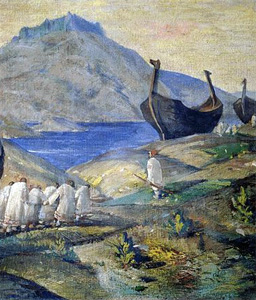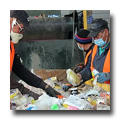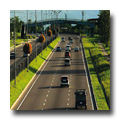Regime Change in Iran, 100 Years Ago
by
At the last Iranian presidential elections, candidate Ghalibaf declared wanting to be the Reza Khan of the Islamists (of the Hezbollahis). In light of what I recently wrote about him and his privileged position with Putin to become the successor to the Supreme Guide, it is appropriate, in this anniversary period, to recall who Reza Khan was and how the Russians made him the Shah of Iran.Will Ghalibaf Be the Successor to Khamenei?
by
Yesterday, the Speaker of the Iranian parliament, Mohammad Baqer Ghalibaf (Qalibaf), had just returned from a three-day trip to Moscow. On his return, he announced with horns that his country will soon join the Eurasian Union (EAEU), which would be a sure way of making Iran a part of the new Russian empire that Putin is reconstituting. By this, the Russians are succeeding in doing what they have not been able to achieve in more than two centuries, namely to integrate Iran into their (...)Iranians’ Attitudes toward Religion
by
A recent online survey by scholars at two Dutch universities of Iranian attitudes towards religion has revealed a stunning rejection of state-imposed adherence to conservative religious mores as well as the role of religion in public life.Biden’s Policy on Iran
by
Given the new American administration under Joe Biden, the big question for us here at the Gazette is what will be the White House’s policy on the Middle East and Iran in particular. Indeed, the past shows that leaders do not necessarily do what they have said and promised.A New War in the Middle East in Perspective

by
With Trump’s chances of staying in the White House melting like snow in the sun, and Joe Biden’s promise to rejoin the nuclear treaty with Iran (JCPOA), the Islamic regime in Tehran is breathing again. The exchange rate of currencies against the Rial shows it well: 273,000 rials for $1 two months ago against 250,100 today. The Iranian currency (...)Whither the Arab and the Muslim World?

by
An agreement to establish diplomatic relations between the United Arab Emirates and Israel and a Saudi-Pakistani spat over Kashmir coupled with feuds among Gulf states and between Turkey, the Kingdom, and the Emirates drive nails into the notion that the Arab and Islamic world by definition share common geopolitical interests on the basis of (...)Uranium Market amid COVID-19
 NUR-SULTAN / ex ASTANA (Kazatomprom press service) — JSC National Atomic Company “Kazatomprom” (“Kazatomprom”, “KAP” or “the Company”) announces the following operations and trading update for the second quarter and half-year ended 30 June 2020.
NUR-SULTAN / ex ASTANA (Kazatomprom press service) — JSC National Atomic Company “Kazatomprom” (“Kazatomprom”, “KAP” or “the Company”) announces the following operations and trading update for the second quarter and half-year ended 30 June 2020.
Tajikistan’s Integration Development in 2019

by
MOSCOW (EDB press service) — Remittances remain strategically important to stimulating consumer and investment demand in the country, as well as to Tajikistan’s balance of payments, as they compensate the significant foreign trade deficit. This finding is presented in the report entitled Main Tendencies in Tajikistan’s Integration Development in (...)Iran Economic Monitor
by
The World Bank has just published its Iran Economic Monitor which examines the main economic developments and policies in a global and long-term context and assesses their implications for the country’s prospects. The study covers macroeconomics, financial markets, indicators of well-being and human development. It is intended for a wide audience, including policymakers, business leaders, financial market participants and the community of analysts and professionals engaged with (...)ADB Assesses Economic Losses in Kazakhstan
The crisis caused by the coronavirus pandemic hit all the countries worldwide simultaneously. In an interview with Interfax-Kazakhstan, Country Director of the Asian Development Bank (ADB) , Kazakhstan Resident Mission Giovanni CAPANNELLI told about how the current crisis differs from the previous ones, as well as the scenarios of further development of the Kazakh economy in the current (...)Asia Is Lying
by
For over two months now, the coronavirus death-counter in China has been stuck at 4,634. Since then, the world’s most populous country, where the pandemic began, has fallen in the world rankings to 21st place in terms of infections (83,430 cases) and 18th in terms of deaths. At this rate, even Greenland will soon overtake China. Impressive, isn’t it? No.What Erdogan Wants
by
While the world lives in the midst of Coronavirus Dooms Day, Erdogan seems to be inhabiting another planet, totally spared by the COVID-19 pandemic. Indeed, Turkey reported its first case of infection only this past Tuesday, and at the time of writing, just five cases of infection have been officially recorded.







Latest comments